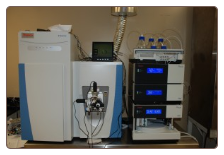|
|
|
|
|
|
|
|
|
|
|
|
|
|
|
|
|
|
|
|

Search by Keyword

Product Categories
 |
| Click to enlarge image(s) |
Mass spectrometry has been widely used to analyze biological samples and has evolved into an indispensable tool for proteomics research. Our desire to understand the proteome has led to new technologies that push the boundary of mass spectrometry capabilities, which in return has allowed mass spectrometry to address an ever-increasing array of biological questions. The recent development of a novel mass spectrometer (Orbitrap) and new dissociation methods such as electron-transfer dissociation has made possible the exciting new areas of proteomic application. Although bottom-up proteomics (analysis of proteolytic peptide mixtures) remains the workhorse for proteomic analysis, middle-down and top-down strategies (analysis of longer peptides and intact proteins, respectively) should allow more complete characterization of protein isoforms and post-translational modifications. Finally, stable isotope labeling strategies have transformed mass spectrometry from merely descriptive to a tool for measuring dynamic changes in protein expression, interaction, and modification.
Protein Profiling
Proteins are the key functional actors in all cellular processes, and diseases almost always manifest at the level of proteins. The analysis of all expressed proteins (the proteome), for example healthy and diseased tissues, is definitely the most applicable approach to uncover key players, which are often named as biomarkers or functionally related protein signatures.
Poochon utilizes a combination of the IEF and gel-based fractionation technologies, the SILAC labeling technology, and the latest Mass Spectrometry technology. As a result, we are able to perform large-scale protein identification, quantitation, and global proteome analysis, identifying up to 6,000 proteins for each cellular or tissue sample. The availability of large-scale quantitative global proteome analyses will enable the identification of biomarkers, relevant drug targets, and proteome signatures.
Custom Protein Function Analysis
Understanding protein functions is one of the keys to understanding life at the molecular level. It is also important in the context of human disease because many conditions arise as a consequence of alterations to protein functions. The recent availability of relatively inexpensive sequencing technologies has resulted in thousands of complete or partially sequenced genomes with millions of functionally uncharacterized proteins. Such a large volume of data, combined with the lack of high-throughput experimental assays to functionally annotate proteins, attributes to the growing importance of automated function prediction. Here at Poochon, we provide you the service of analyzing and producing a detailed analysis on the functions, properties, and uses of any protein sequence.
Proteomics Services
| Item# | Description | Unit price ($) |
| ID-101 | Protein identification – Identify proteins from gel bands/spots Sample type: Gel band or spot. Services include: In-gel trypsin digestion and peptide extraction, LC-MS/MS and data report. |
$250/samples |
| ID-202 | Protein identification – Identify proteins from biological samples including cell lysates, tissue lysates, IP product, pull-down product, or proteins mixture. Sample type: Frozen liquid,, in-SDS sample buffer, or lyophilized. Services include: Sample preparation for MS analysis, LC-MS/MS analysis, and data report. |
$500/sample |
| Q-1 | Proteomic profiling – Identify > 4000 proteins per sample (tissue or cell line samples) Sample type: Frozen cell pellet (>=2x106 cell/sample). Fresh frozen tissues (>=200 mg/sample). Services include: Sample preparation, fractionation, digestion, LC-MS/MS analysis, Proteome characterization, and data report. |
$4000/sample |
| Q-2 | Differential Expressed Protein Profiling – Quantitatively compare the proteomes (>4000 proteins) of pair of samples, or more samples. Sample type: Frozen cell pellet (>=2x106 cell/sample). Fresh frozen tissues (>=500 mg). Services include: Sample preparation, fractionation, digestion, LC-MS analysis, label-free quantitation, Proteome Characterization, and data report. |
$7000/pair samples |
| Q-3 | Differential Expressed Protein Profiling using SALIC-label – Quantitatively compare the proteomes (>4000 proteins) of two or more SALIC-labeled samples. Sample type: Frozen SALIC labeled cell pellet (>=1x107 cell/sample, one of cell line is labeled with Heavy R or/and K). Services include: Sample preparation, fractionation, digestion, LC-MS/MS analysis, SALIC quantitation, Proteome Characterixation, and data report. |
6000/pair samples |
| PTM-1 | Identification of PTM including S/T/Y phosphorylation, R/K methylation, K/H acetylation – Identify PTM sites from crude purified proteins. Sample type: Crude purified protein sample or gel band contains more than 5μg of protein. Services include: Sample preparation, phosphopeptide enrichment, LC-MS/MS analysis, and data report. |
$800/sample |
| PTM-2 | Phosphoprotein profiling – Identify phosphorylated proteins. Sample type: Fresh frozen cell pellets (>=2x107 cell/sample), fresh frozen tissues (>=200 mg),. Services include: Sample preparation, phosphopeptide enrichment, LC-MS/MS analysis, and data report |
$4000/sample |
| PC-1 | Proteome Characterization – Evaluatie the completeness and variability of a proteome profile Sample type: Proteomic profiling MS raw data files or msf files Services include: Use five standardized parameters (identification, distribution, integrity, specificity, and variability) to describe and define a proteome profile |
$1000/pair data sets |
| CUS-1 | Customized proteomics project – you name it | Quotation |

Shopping Basket
| Items: | 0 |
| Subtotal: | $0.00 |
Note: All prices in US Dollars
customer@egfie.com